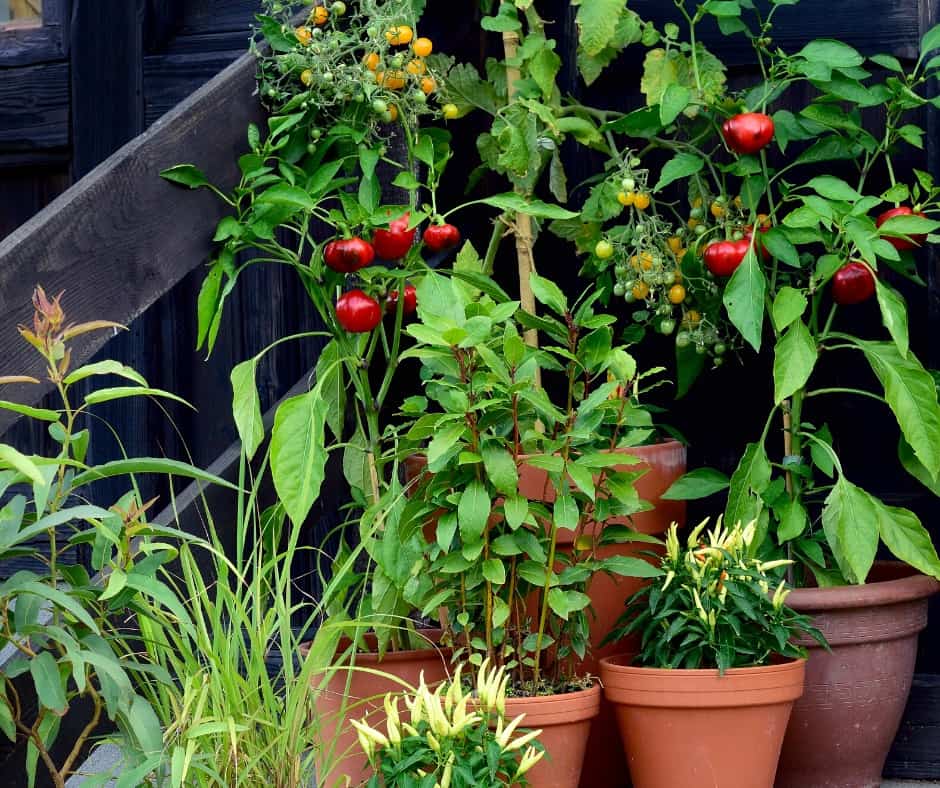Balcony gardens are a great way to keep gardening when you move into a condo building or retirement living. I see many older adults mourn the loss of their large gardens when having to make a move. Are you feeling like you won’t be able to go out in an evening and sit in your garden? Do you feel you will miss the joy of harvest time with your own fresh vegetables? Is gardening your way to keep fit and you feel you will miss it? These are all valid concerns.
If you are delaying a move because you don’t want to loose your garden, I hope article gets you excited about a different type of gardening you can try. Balcony gardening can be just as wonderful as your home garden with a bit of planning.
4 Things to Think About Before Starting
Are You Permitted a Garden
Every building has different rules and regulations. Be sure to check yours before you get started. Are you allowed planters on the railing or just pots on the floor? Knowing the rules will ensure you are living somewhere to support your growing passion!
What Sun Exposure Do You Have
If creating a balcony garden interests you – you need to plan your move so you have the perfect balcony for growing. Do you want to grow veggies and need a lot of light and heat that a south balcony can give you? Do you want low maintenance shade plants that would thrive on a NE balcony? Figuring out what you want to grow is a great way to figure out what type of balcony to look for in your new residence. You may also want to think of the climate of your balcony – is it generally really windy, on a cool day is it still hot. These factors will affect your plants as well.
What is Your Commitment Like
Some balconies are covered, thus don’t get much natural water to the plants you choose to grow. Making sure you are comfortable with the watering demands and carrying a water jug if you have a covered balcony, possibly up to twice a day if you have a really hot balcony. If you are looking for low maintenance plants that can manage mostly on their own – plan accordingly.
Planning Your Space
Once you understand your sun and your balcony – you can plan the amount of space you have for containers and other furniture you need on the balcony. How much can you fit? Do you have storage on your balcony for your watering cans, fertilizer, potting soil and garden tools? Knowing what sized containers will fit will help determine what you can grow.

Once you have the basics figured out for your condo garden or retirement living balcony – you can start planning what to plant. You might be amazed what can grow in a container. Here are some short lists to get you started with some creative ideas.
Vegetables to Grow in Balcony Gardens
The following are some vegetables that grow quite well in balcony containers.
- Cucumbers
- Tomatoes
- Lettuce, Kale, Spinach
- Celery
- Squash & Zucchini
- Spring Onions
- I’ve even seen someone grow Potatoes in their balcony garden!
Other Items to Grow on Your Balcony
Beyond vegetables, there are a variety of other items you can easily grow on your balcony if you wish.
- Strawberries
- Herbs (Rosemary, Thyme, Basil, Parsley)
- Lavender
- Other flowers or climbing vines (if permitted)
When I help someone find the next housing option for them, we always talk about hobbies, including gardening before getting started. It is important to know upfront if you would find happiness in creating your very own balcony garden. With that information I can help you search not only for the right residence, but the right suite that will have the perfect balcony to meet your gardening needs.
If you’ve been putting off making a move for your health, because you worry about losing your garden, let’s chat. In my housing consultation we will work together to understand all your needs and find the right home for you – including one that can have a balcony garden.
I don’t want to see you move somewhere your green thumb cannot flourish! I want all the joy you have from your current garden to follow to your new home with a balcony garden!
PS. And if your new home doesn’t allow balcony gardens – be sure to check out community gardens that may be in your area. They are an inexpensive way to be able to grow all you want to!






